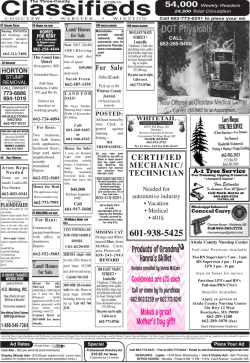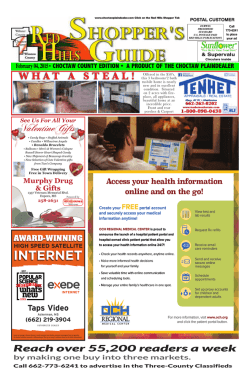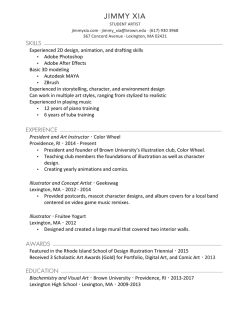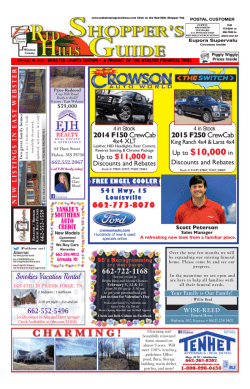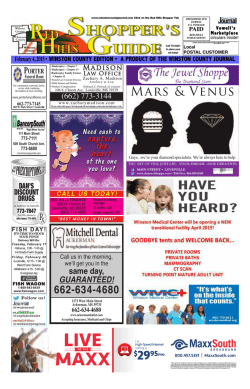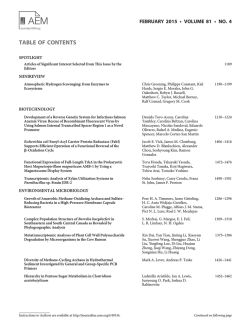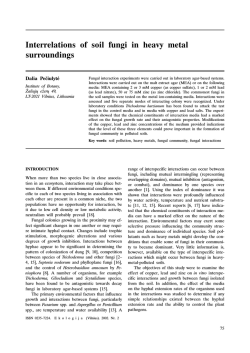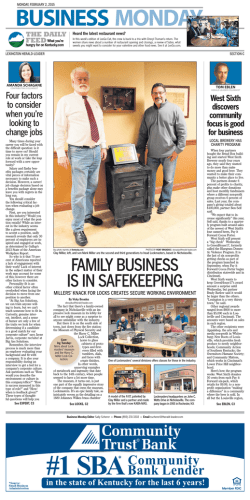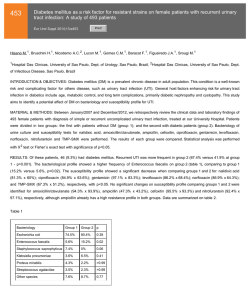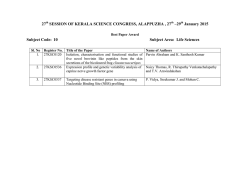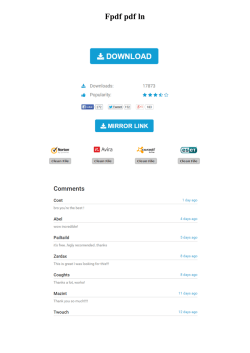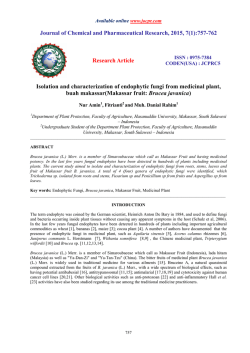
SCACM Workshops
SCACM Workshop Description Galt House, Louisville, KY Wednesday, March 25, 2015 A Practical Guide to Antimicrobial Susceptibility Testing in 2015 8:00 am-4:30 pm Stella Antonara, PhD, D(ABMM) Nationwide Children’s Hospital, Columbus, OH Janet Hindler, MCLS MT(ASCP), UCLA Medical Center, Los Angeles, CA James Snyder, PhD, D(ABMM), F(AAM), University of Louisville, Louisville, KY Lori Madison, MT (ASCP), Norton Healthcare, University of Louisville, Louisville, KY Cindy Burch, MT(ASCP), Nationwide Children’s Hospital, Columbus, OH P.A.C.E.® # 362-112-15 Level: Intermediate Contact Hours: 6.0 Lectures- Discussions Under the guidance of one the leading experts in antimicrobial susceptibility testing SCACM is proud to present a workshop on this fundamental topic in clinical microbiology. What are the available antimicrobial agents and the mechanism of resistance by commonly encountered bacteria? Which are the most noteworthy issues in detecting and reporting resistance in gram positives, gram negatives and yeast? How do you implement CLSI changes in your lab? All of the above and more will be discussed by experts in their field and experienced bench level microbiologists. Objectives: The attendees should be able to: 1. Describe available antimicrobial agents and intrinsic resistance profiles of commonly encountered bacteria 2. Identify issues for detecting and reporting resistance in bacteria and yeast 3. Explain the value of using expert rules to help identify potential problems and enable effective reporting of antimicrobial test results. Fungi Can be Fun; Just Get to Know Them 8:30 am -4:30 pm Davise Larone, PhD, D(ABMM), F(AAM) Professor of Clinical Pathology and Laboratory Medicine Professor of Clinical Microbiology and Immunology Weill Medical College of Cornell University, NY, NY P.A.C.E.® # 362-113-15 Level: Intermediate Lecture-Discussion Minimum: 10 Contact Hours: 6.5 Maximum: None The aim of this PowerPoint presentation is to arm the participants with knowledge and understanding that will increase their comfort and enjoyment in the mycology lab. Most aspects of clinical mycology will be covered. Included will be mycologic terminology, staining methods, direct microscopic examination of specimens, and up-to-date information on isolation, identification, and susceptibility testing. Identifying characteristics of the individual fungi in each of the major groups will be discussed, i.e. (in alphabetical order), the dematiaceous fungi, dermatophytes, hyaline hyphomycetes, thermally dimorphic fungi, yeasts, and zygomycetes. It will be a long day, but the time will fly. Objectives: The attendees should be able to: 1. Utilize unique terminology employed in mycology 2. Perform and interpret direct microscopic examination of specimens for fungi 3. Employ preferred laboratory methods for isolating and identifying fungi 4. Describe the various methods for antifungal susceptibility testing 5. Recognize morphologic characteristics of cultured fungi 6. Identify a broad range of isolates Laboratory of Tomorrow, Today Leave Louisville 7:30 am, leave UK by 2 pm This workshop will be held at the University of Kentucky, Lexington, KY. Transportation provided from Louisville by Copan. Details will be emailed to registrants. Julie Ribes, MD, PhD, University of Kentucky, Lexington, KY Sandra Mills, BS, MT(ASCP), University of Kentucky, Lexington, KY P.A.C.E.® # 362-114-15 Level: Intermediate Contact hours: 3.5 Lecture-Lab Tour Limits: 18 participants, limit 1 person per health care facility if this workshop exceeds 18 The workshop will encompass bringing the Lab of Tomorrow live at UK HealthCare. The first step is to get buy in from Hospital Administration for the big purchase. Then you need to decide what and how to validate. What are the keys to a successful implementation (IT, work flow, collaboration with services outside the lab area?) Finally, there will be a 30 minute tour of the UK HealthCare Clinical Microbiology Laboratory to see the automated front end, MALDI-TOF, and Multiplex platforms in action. Objectives: The attendees should be able to: 1. Formulate a plan to get buy in for Automated, digital microbiology for their lab 2. Formulate a plan to validate the components of the automated processor, automated reader, digital plate reading, and multiplex PCR/microarray tests 3. List the issues to be considered for implementation of the components of the lab of tomorrow SCACM Workshop Registration Form Wednesday, March 25, 2015 TITLE Susceptibility Fungi Can Be Fun Laboratory of Tomorrow, Today TIME SCACM Member* 8:00 to 4:30 8:30 to 4:30 7:30 to 2:30 Nonmember $100 $125 $100 $125 $100 $125 NOTE: All Workshops include Lunch (Please PRINT) ___________________________________ Name ___________________________________ Institution (___)_______________________________ Daytime Phone Extension ___________________________________ Email ___________________________________ Home Address _______________________________________ City, State, and Zip SCACM member (*Dues paid by February 1, 2015 Non-Member ____ ___
© Copyright 2026
